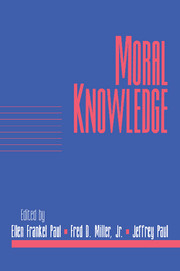Book contents
- Frontmatter
- Contents
- Introduction
- Acknowledgments
- Contributors
- Realist-Expressivism: A Neglected Option for Moral Realism
- Thinking about Cases
- But I Could Be Wrong
- Moral Facts and Best Explanations
- Two Sources of Morality
- “Because I Want It”
- Realism, Naturalism, and Moral Semantics
- Incomplete Routes to Moral Objectivity: Four Variants of Naturalism
- Explanation, Internalism, and Reasons for Action
- Moral Knowledge as Practical Knowledge
- Practical Reason and Moral Psychology in Aristotle and Kant
- Hypothetical Consent in Kantian Constructivism
- Mill's “Proof” of the Principle of Utility: A More than Half-Hearted Defense
- Index
“Because I Want It”
Published online by Cambridge University Press: 04 August 2010
- Frontmatter
- Contents
- Introduction
- Acknowledgments
- Contributors
- Realist-Expressivism: A Neglected Option for Moral Realism
- Thinking about Cases
- But I Could Be Wrong
- Moral Facts and Best Explanations
- Two Sources of Morality
- “Because I Want It”
- Realism, Naturalism, and Moral Semantics
- Incomplete Routes to Moral Objectivity: Four Variants of Naturalism
- Explanation, Internalism, and Reasons for Action
- Moral Knowledge as Practical Knowledge
- Practical Reason and Moral Psychology in Aristotle and Kant
- Hypothetical Consent in Kantian Constructivism
- Mill's “Proof” of the Principle of Utility: A More than Half-Hearted Defense
- Index
Summary
INTRODUCTION
How can an agent's desire or will give him reasons for acting? Not long ago, this might have seemed a silly question, since it was widely believed that all reasons for acting are based in the agent's desires. The interesting question, it seemed, was not how what an agent wants could give him reasons, but how anything else could. In recent years, however, this earlier orthodoxy has increasingly appeared wrongheaded as a growing number of philosophers have come to stress the action-guiding role of reasons in deliberation from the agent's point of view. What a deliberating agent has in view is rarely his own will or desires as such, even if taking something as a reason is intimately tied to desire. Someone who wants to escape a burning building does not evaluate her options by considering which is likeliest to realize what she wants or wills. She is focused, rather, on her desire's object: getting out alive. The fact that a successful route would realize something she wants is apt to strike her as beside the point or, at best, as a trivial bonus.
This point is sometimes put by saying that desires are in the “background,” rather than the foreground, of the practical scene a deliberating agent faces. The metaphor is somewhat misleading, however, since an agent's desires are normally not so much in the background of her deliberative field as outside of it altogether. If we must locate them spatially, a better place might be within or behind the standpoint from which the agent views her alternatives rather than toward the back of the scene she views.
- Type
- Chapter
- Information
- Moral Knowledge , pp. 129 - 153Publisher: Cambridge University PressPrint publication year: 2001
- 1
- Cited by



